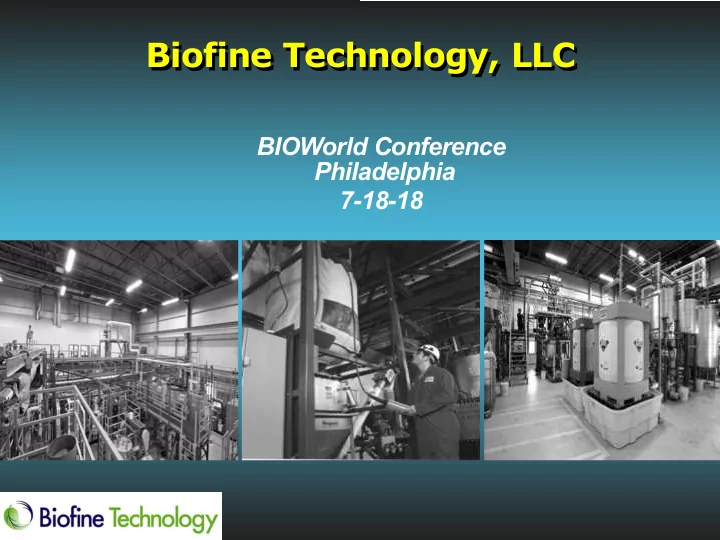

Biofine Technology, LLC BIOWorld Conference Philadelphia 7-18-18
The Biofine Process A proprietary, continuous rapid chemical refining process that enables the production of high value renewable chemicals and biofuels from cellulosic residues. Cellulose • The US DOE and NYSERDA initial funding Sugars • 1999 Presidential Green Chemistry award • 1 MT/day demonstration plant (UMO owned) Intermediates I • Strong intellectual property portfolio • Key derivative Ethyl Levulinate (EL) HMF • Focus on biofuels - heating fuel and jet fuel. Intermediates II Levulinic Acid (50 % yield)
Levulinic Acid Derivatives O OH O • The Biofine Process converts low lost cellulose into levulinic acid • Levulinic has been known for a long time (1870’s) - Used in food, fragrances, and specialty chemical applications - Sold as a high price specialty chemical with a limited market - Currently produced from furfural or maleic anhydride - A versatile chemical intermediate • This process promises to provide low cost, levulinic acid on a large scale for the first time
First Stage Biofine Process-Cellulose Pathway Plug Flow Reactor Cellulose Fast Reaction (Seconds) Sugars Intermediates I CH 2 OH OHC O Slow Reaction Intermediates II (Minutes) Tars Levulinic Acid Second Stage (30 wt%) (50wt %) Back Mixed Formic Acid Reactor (20 wt %)
Future Biorefinery Feedstocks O O O O OH O HO HO OH HO OH O 2,5-Furancarboxylic Acid 3-Hydroxypropionic Acid Succinic Acid O OH OH O NH 2 OH O HO OH HO OH NH 2 O OH OH OH O O Aspartic Acid Glucaric Acid Glutamic Acid O O O O OH OH HO O O HO Itaconic Acid Levulinic Acid 3-Hydroxybutyrolactone OH OH OH OH OH OH HO OH OH OH OH OH OH OH Glycerol Sorbitol Xylitol
Selected Derivatives of Levulinic Acid Levulinic Acid Nylon Intermediates Solvents, Surfactants O OH CO 2 Me O N O R CN Biofuel Additives High Tg Polymers O O R O O O O O N O O O O R X - N + Ionic Liquids
The Value Chain Partnerships Cellulosic Drop-In Downstream Biofine Process Feedstock Product Demand Conversion Levulinic Acid Wood Heating Fuels 3-HPA Formic Acid Wood pulp Acrylic Acid Furfural Jet Fuels Cellulosic Sludge Succinic Acid Ligneous Char Plastics/Plasticizers Waste Paper/OCC Ethyl Levulinate Bio-Methane Agriculture Crops TDO Hydrocarbons Cosmetics MSW (UMO) Flavor & Fragrance DALA Resins & Coatings Diphenolic Acid Carbon Fiber
Fuel Additives-Biofine O O OH OEt + EtOH + H 2 O Acid O O • Meet or exceed ASTM D-975 diesel fuel standards • Fully compatible with diesel fuel • Route for ethanol into heavy fuels • Very high lubricity (reduced sulfur fuel) • Low volatility (high flash point) • Oxygen content 33% • Reduces smoke (soot) significantly • Suitable as a blendstock for FAME esters • Projected production cost - $0.50/lit. ($17/GJ)
Technical Benefits as a Heating Fuel • NEGATIVE CARBON DIOXIDE LIFE CYCLE ASSESSMENT AS A FUEL • INCREASES COMBUSTION EFFICIENCY OF FUEL BLENDS: EL = 33% OXYGEN • REDUCES COMBUSTION PARTICULATE (SOOT) AND CARBON OXIDES • REDUCTION IN BLEND SULFUR EMISSIONS (zero sulfur in EL) • GIVES HEATING OIL A LOWER GHG FOOTPRINT THAN NATURAL GAS @ 10% BLEND • BIGGER REDUCTION IN GHG FOOTPRINT THAN SOY BIO-DIESEL • ALLOWS ZERO OR NEGATIVE CARBON EMMISSIONS FOR HOME AND COMMERC’L FUELS • IMPROVES LOW TEMPERATURE HANDLING (GELL PT. CLOUD PT., CFPP) • INCREASES LUBRICITY AND LOWERS VISCOSITY OF FUEL OIL BLENDS • EASILY BLENDS WITH BASE FUELS • INCREASES OXIDATIVE STABILITY OF BIODIESEL (RANCIMAT DATA)
Potential Carbon Dioxide Emission Reduction Using EL in Heating Fuel (lb/house/year)
Timeline Test Market - Commercialization 2017/2018 – Field Test of EL blends = 10 - 20 homes for full season Location: Maine Partners: Oil Company, NORA – Production, Operations, Logistics, Monitoring, Evaluation 2018 – 2020 – Expanded Testing/Demonstration Market and Full Scale Plant Construction in Maine 2021 First Plant Operational - Manufacturing EL from waste biomass 3 Million gallons/year EL + specialty chemicals Fuel priced at par with #2 heating fuel (approx. $2.00 per gallon) Eligible for D7 RINS (approx. $2.50/gallon) Feedstocks – MSW-derived and waste forest biomass 2021 – 2023 Construction of Larger Plant in Maine Approximately 10 Million gallons per year EL for heating fuel Larger scale eliminates dependency on RINS Potential Blending with UMO TDO-derived hydrocarbons
Biofine Contacts Dr. Stephen W. Fitzpatrick Direct: (781) 389-4011 Email: steve@biofinetechnology.com Mike Cassata Direct: (617) 620-8664 Email: mcassata@biofinetechnology.com Biofine Technology LLC 229 Clark Rd., Brookline, MA 02445
Recommend
More recommend